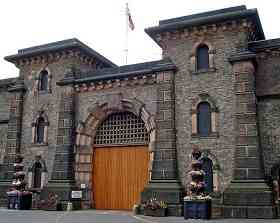Concurrent and Consecutive Jail Sentences
What happens if someone gets convicted of committing more than one crime?
As a rule, they would receive a separate sentence for each crime that they committed. In this case, the sentences are likely to be either concurrent or consecutive.
Getting concurrent sentences means you serve both (or all if more than two) at the same time.
You would serve consecutive sentences one after the other. For example: A 6 month sentence could get served first and get followed straight after by a 3 month sentence.
Note: The role of the judge (or magistrate) includes clarifying the type of prison sentence handed out and how it will get served.
Suspended Prison Sentence
Offenders would carry out a ‘suspended‘ prison sentence within the community. In this case they must meet certain conditions in the sentence such as:
- Carry out unpaid work called ‘Community Payback‘.
- Staying away from a certain place or a certain person.
Note: Breaking the conditions of a suspended sentence means you can get sent back to prison.
Determinate Prison Sentence (fixed time length)
A ‘determinate‘ prison sentence is one that has a fixed length of time attached to it.
Determinate Prison Sentence Under 12 Months
Offenders often get released half way through a determinate prison sentence if the jail term is for less than 12 months.
Determinate Prison Sentence 12 Months (or longer)
A sentence of 12 months or longer means you would spend the first half of the sentence inside a prison. The second half is usually carried out in the community ‘on parole or on licence‘.
There are conditions attached to an early release from prison. You would go back to jail if you break any of the licence conditions or commit another crime. Wearing an electronic monitoring tag is often a community service condition.
Indeterminate Prison Sentence (no fixed length of time)
The ‘indeterminate‘ prison sentence is different than the ‘determinate‘ sentence. That is because indeterminate means there is no fixed length of time.
So receiving indeterminate sentences means:
- There is no set date made for the release of the prisoner.
- The person must spend a minimum term in prison before a release gets considered. This type of sentence condition is also called a ‘tariff‘.
Getting an early release from any of the prisons in the United Kingdom is the responsibility of the Parole Board.
Note: Courts issue indeterminate jail sentences for crimes committed by offenders who might be a danger to the public.
Prison Life Sentence UK
 The courts in the United Kingdom must give a life sentence to anyone found guilty of committing murder.
The courts in the United Kingdom must give a life sentence to anyone found guilty of committing murder.
A court may also choose to hand out the maximum prison sentence in the UK (a life sentence) for other serious offences such as:
- Armed robbery
- Rape
Note: Receiving a life sentence means it will last for the rest of your life. But, getting released from prison and then committing another crime means you can get imprisoned again and at any time.
Sentences for Young Offenders
There are several different types of jail sentences that get handed out to young offenders in the United Kingdom. The sentencing of young offenders (under 18 years old) uses a different process than for adults.
Whole Life Term Prison Sentence
The judge can decide to give a whole life prison term. That means there is no minimum term set and the offender is never considered for release.
Detention and Training Order
The courts can give a Detention and Training Order to a young offender aged between 12 and 17. As a rule, this type of punishment lasts between 4 months and 2 years.
Young offenders serve the first half of a Detention and Training Order in custody. They would usually serve the second half in the community.
Severe Crimes: Violent or Sexual
Young offenders can get an ‘extended sentence’ for committing severe crimes. That means they could spend a very long time in custody. They can also get put under electronic tagged supervision for a long time once they get released.
Prison Sentences for Murder
Courts set the minimum time spent in custody for committing murder. There are special parole procedures for young offenders. They cannot apply for parole before the minimum time gets served. The person would get kept under monitored supervision for the rest of their life (if released).
Sentences for other Serious Crimes
In some cases, sentences for young people can last as long as the sentence for an adult for the same offence. But, they cannot be any longer, including life sentences.

